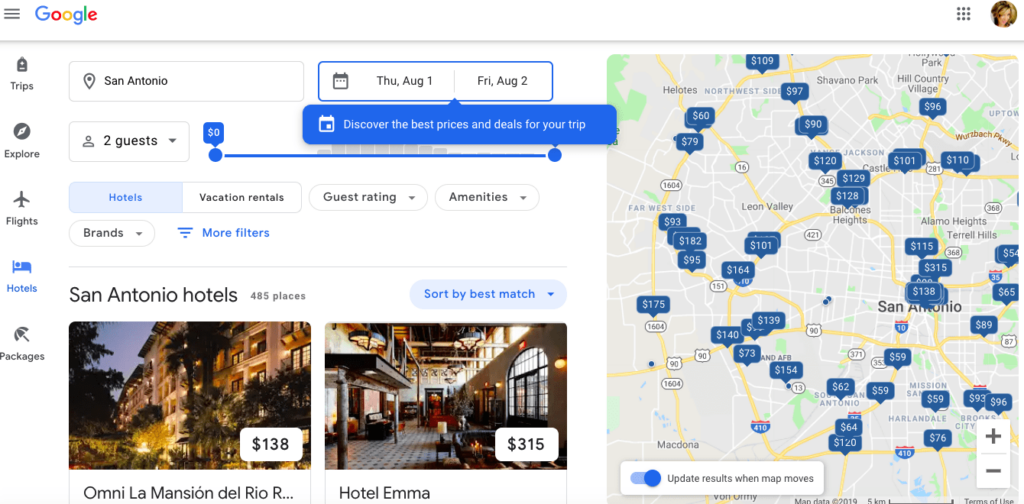
Google continues its fast foray into the travel industry, expanding existing features and rolling out new user tools for booking flights, hotels, entertainment, business conferences and more.
When you consider all the data Google has access to, from user-generated travel photos and reviews to aggregated air travel and hotel pricing information to Google Maps, and combine that with slick user-friendly design, Google is positioned to be the one-stop-shop for online travel booking.
Hoteliers may think this might disrupt current Online Travel Agencies (OTA’s) such as Travelocity, Expedia, TripAdvisor and the many other competitors the most, but with Google’s latest redesign, it’s ability to curate or recommend trips based on a user’s search history, and its powerful reach in promoting their service, Google Hotel Booking is at your door.
What is Google’s Hotel Search Feature?
Google’s Hotel Search features offer similar functionality and tools as most online booking sites, but it pulls data from many different resources. It also pulls data from booking partners and Google My Business (GMB) listings so it includes flight info, travel packages and more.
Basically, it aggregates the information from OTAs, airlines throughout the web, and puts it together in one search engine results page creating a fast and comprehensive user experience.
How Does Google’s Hotel Search Play an Important Role for Hotels?
The majority of a user’s booking journey begins with a Google search. (This statistic is supported by data confirming that OTAs spent heavily on search advertising in 2018). Hotels must have a strategy in the digital marketing channel to convert as many of these searches as possible to direct bookings.
How Will Updates on Google’s Hotel Search Provide Opportunities for Hotels and Disrupt Online Booking Sites?
Google’s updated Hotel Search features greatly improves the ‘deal-finding’ nature of aggregated content. Google’s hotel panel makes it easier for potential guests to compare prices between OTA’s and direct booking at Hotels.
OTA’s might see a drop in user engagement if direct booking is the better deal in the comparison, and is easily accessible with less searching.
Deals Feature
- After a user enters a query related to finding a hotel, Google brings up a search panel in the search engine results page. One of the new updates included in the “deals” feature allows the user to find hotel deals in comparison to other hotel brands including visuals of price, rating and location information.
- Once the user clicks on a hotel listing, they’re brought to a new screen, which shows the prices across OTAs, including the hotel’s very own listing price.
- For example, the image below shows all the pricing options for The Venetian hotel (Hotel Ads), including additional fees.
- Naturally, users gravitate to the best price and can see that booking on the official site is the cheapest option. This opens up new opportunities for hotels to obtain more direct bookings.
Smaller Features
- Also note small but important new features that provide users the option to visit the hotel’s website and make phone calls directly to hotels.
- These options can potentially play a vital role, as it gives users the option to bypass the OTAs entirely. An example of this can be viewed down below.
How Can Your Hotel Optimize Opportunities for Exposure and Conversions with Google’s Updated Hotel Search?
- Make Sure Your Hotel’s Google My Business and local listings are accurate and optimized.
- Participate in Google Hotel Ads to ensure your hotel website is competing with OTAs in this highly visible space.
- Encourage guests to write reviews and make sure you are responding to them – on all important channels and especially on Google. If your hotel isn’t getting positive reviews – make sure to address the issues whether it’s customer service or product-related.
- Make sure you have a competitive rate strategy in place and your lowest rates are only found on your website.
- Optimize your website with location focused keywords and optimize for demand driving location attractions and/or events.
- Partner with local events, organizations, conventions and more to gain exposure and potentially links from local businesses.
Reference URLs:
- https://skift.com/2019/03/11/google-quietly-releases-its-hotel-booking-destination-with-potentially-huge-implications/
- https://searchengineland.com/what-will-google-hotels-mean-for-online-booking-sites-313851
- https://www.travelandleisure.com/hotels-resorts/google-hotels-update
- https://www.bloomberg.com/news/articles/2019-03-08/google-search-dominance-has-businesses-paying-for-their-own-name
- https://triptease.com/blog/google-hotel-site/
- https://searchengineland.com/what-will-google-hotels-mean-for-online-booking-sites-313851

